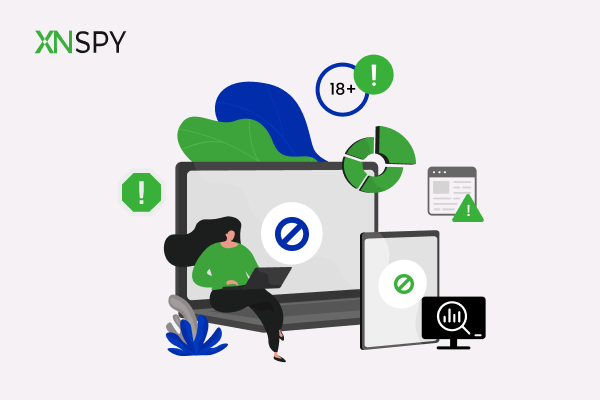The complete monitoring experience for your phone
Get XNSPY and start tracking calls, texts, multimedia, locations and more on any phone!
Get Started Now Live DemoIs spanking your kid improving their behavior, or is it intensifying it?
Kids will be kids, and they are going to make bad choices, whether on purpose or by accident. Regardless of the fact of how infuriating those choices are, it is part of growing up. Of course, we made mistakes in the past, and probably most of them are ones our kids are making now. But the real question is: How do we help our kids to learn from these mistakes?
With fear, anger, and desperation, most of the parents turn to spank when they want their kids to be better human beings. Maybe you were spanked as a kid, and it feels instinctual. Maybe you were spanked and think, “I learned from my mistakes better.” Or maybe you take spanking as generational propaganda.
Whatever the reason is, the question arises: Even if spanking make your kids stop their actions momentarily, are they learning what they should do differently next time? So, what is the point of spanking if the vicious cycle never ends?
Well, there are more effective tools you can use to discipline your kids. To make parenting easier for you, we have outlined seven alternative tools you can use before you consider spanking as a discipline strategy.
- Take time for teaching them
Disciplining kids implies training them to behave properly and holding them accountable with respect. This way, you can teach kids how to make better choices in the future. For instance, if you want to teach your kid how to cross the road, you have to spend time first to train them. You shouldn’t expect that they will remember all the rules the second or third time. You will have to repeat the instructions and watch them closely until they are properly trained.
- Control the environment
If your kids make poor choices, accidentally or on purpose, you can try another tool to control the environment or the situation to eliminate potential triggers. For example, if you are trying to teach road rules to your young kid who is unable to understand the dangers of oncoming traffic – even with the training – so controlling the environment to keep them safe is essential.
You can’t expect your kid to behave appropriately in a restaurant, so what you could do is: look for an age-appropriate restaurant to manage defies of family dining. All kids need to learn etiquette and self-control, but as a matter of fact, they will learn through trial and error. As parents, you can offer guidance, but we can’t set them up to experience all the challenges on their own. So, whenever things are within your control, set the stage to practice making the right choices.
- Stay calm
Staying calm is a powerful tool that can help you in the teaching discipline. Of course, it is the most challenging thing to do when you are frustrated, but it is worth it. Kids will listen if you get down to them, lower your voice, and speak calmly. Also, it is recommended to use small and simple sentences. This way, your kid will listen to the information you want to share, as they don’t feel the need to defend themselves.
If your kids are acting out, it is another red signal that they need your love and attention. Staying calm can deliver your emotions in a more impactful way than spanking. Sometimes kids use whining and backtalk as a way to get your attention. In this case, giving them negative attention through spanking would be the worst solution. However, you should simply ignore their behavior.
- Remove your kid from the situation
If you are at a social gathering and your minor starts screaming because the other kid got a balloon, calmly take your kid and step away. Don’t avoid spanking because you are worried about what others will think of you. Avoid spanking because it isn’t a long-term solution. It is going to worsen the situation. Once outside, try to discuss with your kid what was wrong about their behavior. This way, you can turn the whole situation into a teaching lesson.
- Spend quality time
If your minor is acting out continuously to get attention, what could be a better solution than to give him that attention in a positive way? Granting him negative attention will only worsen the situation. Instead of spanking, try spending more quality time with your kids. One-on-one time with each kid is the best way to combat attention-seeking behavior. Giving them this positive attention will develop a strong relationship between you and your kids. What could be better than an improved parent-child relationship?
- Problem-solve together
Whenever you are frustrated or raged with anger for your kids’ negative behavior, instead of spanking, work with them to develop a reasonable consequence for their actions. This way, you can reduce the chances of a power struggle. Don’t think that this is going to be an easy way out. Enforcing consequences and developing a plan together can be incredibly difficult for you. But, you can rest assured that in the long run, your efforts will be paid back.
- Consider natural results
You have to consider all the natural results that will play out without your involvement. However, natural consequences aren’t appropriate in perilous conditions. For instance, you have warned your kids that if they leave their battery-operated toys outside in the rain, their toys will be destroyed. This time, if you see your kid’s toys outside, you don’t have to intervene. Instead of spanking, let them face the natural consequences, which will teach them a lesson. It may seem like a waste of money, but once done, the lesson will be priceless.
Final Words We know some parents will still choose to spank, but we encourage you to try these seven strategies before you are pushed to that point. Certainly, these tools are far more impactful and effective than spanking.


